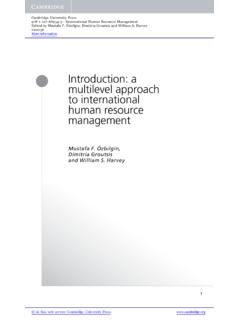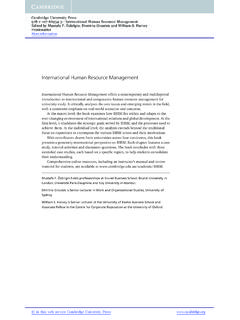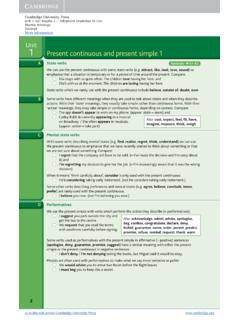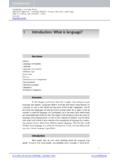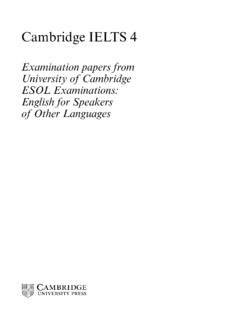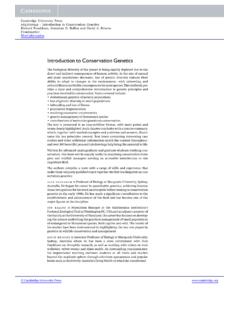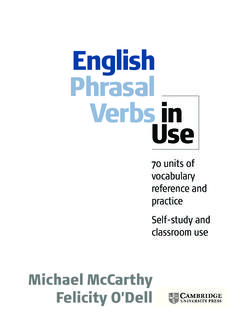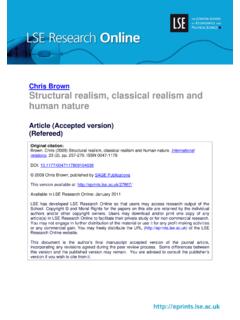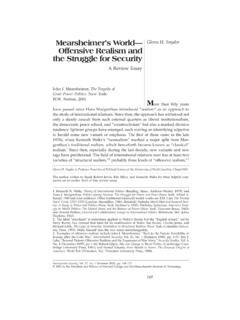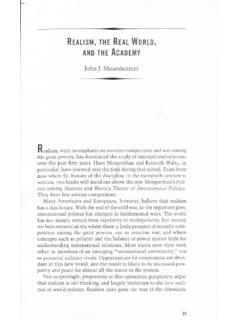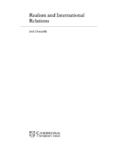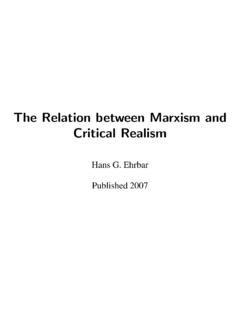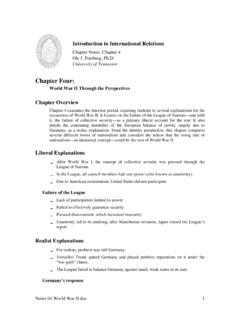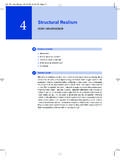Transcription of Realism and International Relations - Assets
1 IntroductionRealism and International relationsThe tradition of political Realism realpolitik, power politics has a longhistory that is typically traced back to the great Greek historianThucydides in the fifth century dominant attitudestowards Realism have varied, realist arguments and orientations have beencentral to the Western theory and practice of International Relations . Inparticular, modern International society, whether dated from the era ofMachiavelli at the turn of the sixteenth century or that of Hobbes in themid-seventeenth century, has been closely linked to realist balance ofpower link between Realism and International theory is especially strongin the twentieth century. International relationsfirst emerged as an aca-demic discipline before and immediately after World War I, largely inreaction against realist balance of power politics. The discipline wasthen reshaped immediately before and after World War II by self-identified realists such as E.
2 H. Carr and Hans Morgenthau. Prominentscholar-practitioners, such as George Kennan and Henry Kissinger,have called themselves realists. For most of the post-World War II erarealism has been the dominant paradigm in the Anglo-American studyof International Relations . Even in our post-Cold War era of globaliza-tion, realist theories, although much less dominant, still provide acontext and motivation for many of the most important theoreticaldebates in book presents a sympathetic but fundamentally critical assess-ment of the character of Realism and its contribution to the study andpractice of International Relations . My approach is critical yet engaged. Iapproach Realism largely on its own terms yet challenge many of its char-acteristic arguments and , for example, Morgenthau (1946: 42), Gilpin (1986: 304), Ferguson and Mansbach(1988: 35, 82), Cusack and Stoll (1990: 1 2, 19), Rosenau and Durfee (1995: 9),Schweller (1997: 927).
3 Cambridge University University Press978-0-521-59752-4 - Realism and International RelationsJack DonnellyExcerptMore informationAccepting Realism s terms of reference does limit criticism to internal critique of its coherence and consistency. Some readers may prefer astrategy of external critique, which takes on realist assumptionsdirectly. But by circumventing the usually fruitless controversy over firstprinciples and basic assumptions, internal critique can achieve a specialpower and choice of critical engagement, however, is more than tactical. Italso reflects my considered judgment of Realism s place in the study ofinternational Relations . I accept and value Realism as a central and peren-nial tradition, orientation, or approach. I try to show why realist argu-ments constantly recur in discussions of International Relations . But I alsohighlight Realism s diversity, ambiguity, problems, contradictions, errors,and lay my cards on the table at the outset, I see Realism as an exagger-ated and dangerously one-sided set of insights rather than a successfulgeneral theory of International Relations .
4 Its enduring contribution lies inthe fundamentally negative task of highlighting recurrent political con-straints posed by International anarchy and human selfishness. It also hasconsiderable promise as a source of partial, mid-level theories. Butrealism fails often spectacularly and tragically in its aspiration toprovide a general explanatory theory of International politics or a pre-scriptive framework for foreign try to give full weight and credit to the insights that have made realisman inescapable feature of the study of International Relations . I am moreconcerned, however, to challenge exaggerated claims for these insightsthat would constrict International political theory and practice to therealm of power politics. Realists understand, and correctly emphasize, thefact that power has been, and will long remain, a central part of interna-tional Relations . Most realists, however, systematically slight other no lessimportant dimensions of International politics.
5 Demonstrating this is oneof my central of the bookChapter 1 introduces the realist tradition through four complementarypaths. I begin with a brief definition that emphasizes anarchy and egoism,and follow with a typology of realist theories. Then, in the central portionof the chapter, I present six realist paradigms : Thomas Hobbes, HansMorgenthau, Kenneth Waltz, the Prisoners Dilemma, Thucydides, andMachiavelli. Finally, I briefly trace the cyclical rise and fall of Realism inthe academic study of International Relations in the twentieth 2 examines realist accounts of human nature and state motiva-2 Realism and International Relations Cambridge University University Press978-0-521-59752-4 - Realism and International RelationsJack DonnellyExcerptMore informationtion. A brief introduction notes that many of our paradigmatic realistsemphasize a motivational triad of fear, honor, and interest, as Thucydidesputs it, or, in Hobbes language, competition, diffidence, and glory.
6 I thencriticize realist approaches that emphasize human nature, with specialattention to Morgenthau. The bulk of the chapter, however, is devoted to acritique of contemporary structural realist efforts to abstract from theattributes of states. I show that Realism not only requires substantive moti-vational assumptions but that the assumptions of contemporary structuralrealists prove to be very similar to and at least as confused and incoherentas those of earlier realists such as Morgenthau and Reinhold 3 deals with realist accounts of International anarchy, payingspecial attention to Waltz Theory of International Politics. I argue thatWaltz misrepresents anarchy as a formless void and wildly exaggerates itspolitical consequences. Anarchic orders may have considerable elementsof hierarchic division of political labor, ranging from the differentiationof political functions represented by spheres of influence to considerableelements of International legal obligation.
7 Anarchy implies only theabsence of hierarchical government, not an absence of authoritative inter-national 4 is a transitional chapter that examines the principal substan-tive conclusion of structural Realism , namely, that states in anarchy balance rather than bandwagon. I argue that balance of power poli-tics depends not on anarchy per sebut on a fear of predation, whichcannot be accounted for independently of the character of those withwhom one interacts. I also examine the distinction between system andstructure, which has been obscured in much recent realist writing andwhich opens up the question of the role of International 5 examines the nature and extent of authoritative order in con-temporary International society. I argue that abstracting from interna-tional norms and institutions, as structural neorealists encourage us todo, is no more profitable than abstracting from the character of critically examining John Mearsheimer s argument that interna-tional institutions have no independent effects on state behavior, Idevelop two extended examples, dealing with sovereignty and thePrisoners Dilemma, that illustrate the central role of International insti-tutions in the practice of International 6 examines the issue of morality and foreign policy.
8 Althoughtwentieth-century realists characteristically deny a place for morality ininternational Relations or at least restrict the role of moral concerns tothe periphery of foreign policy their arguments turn out to be remark-ably diverse, and even contradictory. Furthermore, a careful examina-tion of Thucydides and Machiavelli reveals that these two paradigmaticIntroduction3 Cambridge University University Press978-0-521-59752-4 - Realism and International RelationsJack DonnellyExcerptMore informationrealists actually give a considerable place to ethics in International rela-tions. The chapter concludes by arguing that, as with so much else in therealist tradition, a useful cautionary insight is exaggerated into a mislead-ing and dangerous law of International brief conclusion extends this argument to provide a summary assess-ment of the contributions and limitations of realist theories of interna-tional chapter is followed by discussion questions and suggested read-ings.
9 The questions revisit some of the central issues raised in the text andoften suggest alternative readings or try to push arguments deeper, or in adifferent direction, than they are pursued in the text. Because they pri-marily aim to go beyond, rather than merely review, the main points of thechapter, they should be treated as integral parts of the suggested readings highlight sources dealing with issues raised orleft inadequately explored in the text. Although perhaps less integral thanthe discussion questions, the fact that these are short bibliographic essays,rather than just lists of sources, has allowed me to highlight importanttopics in the text. I thus encourage all readers to at least glance at theseessays, even if they are not at the moment looking for additional each bibliographic essay a few especially recommended readings arehighlighted in bold type. These are not always the most importantsources, but they are both good and relatively easily accessible.
10 Readerswill rarely go wrong by starting their further reading with these convenience, all of the boldfaced readings are collated at the end ofthe volume in a short list of recommended and orientationAs the apparatus of discussion questions and suggested readings indi-cates, this book has been written with advanced undergraduate studentsin mind. I hope, though, that its audience will be significantly larger andby that I do not mean just graduate students. I have tried to write for theintelligent reader with an interest, but no formal training, in (the study of) International Relations . Although I have no illusions that this is a potentialbestseller, or even likely to appear on the shelves of any but large or spe-cialist bookshops, I hope that nonacademic readers who pick it up willfind much of also hope that scholars, no less than their4 Realism and International relations12 Chapter 1, I believe, should be widely accessible to most readers.
